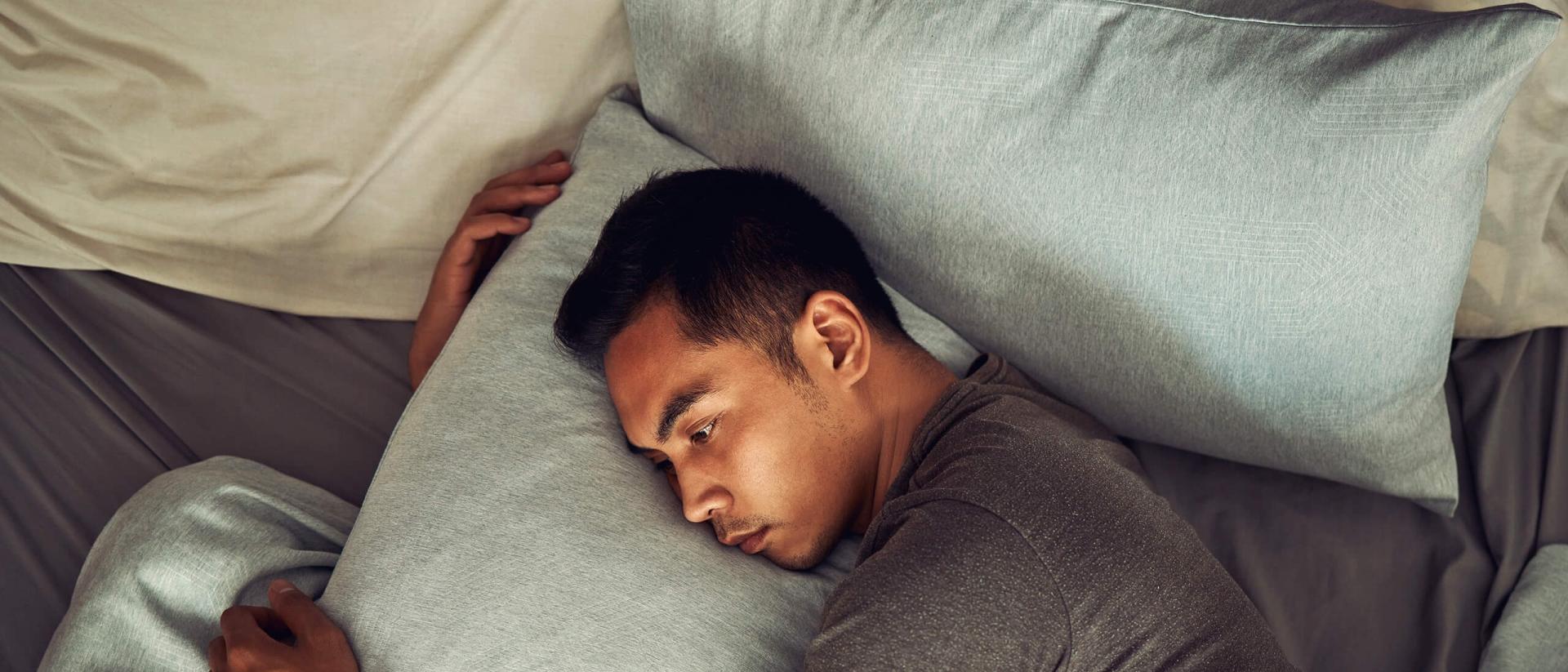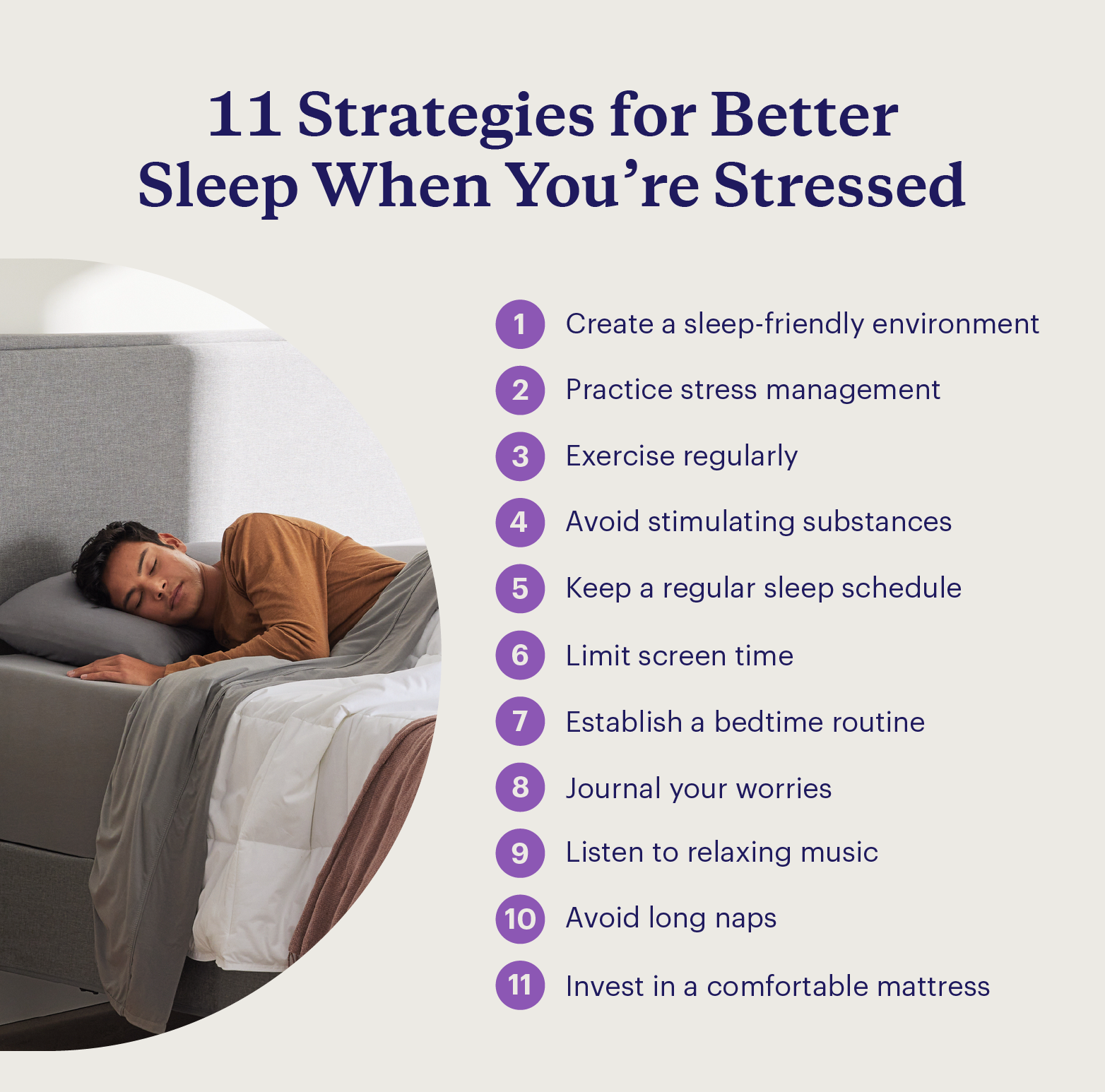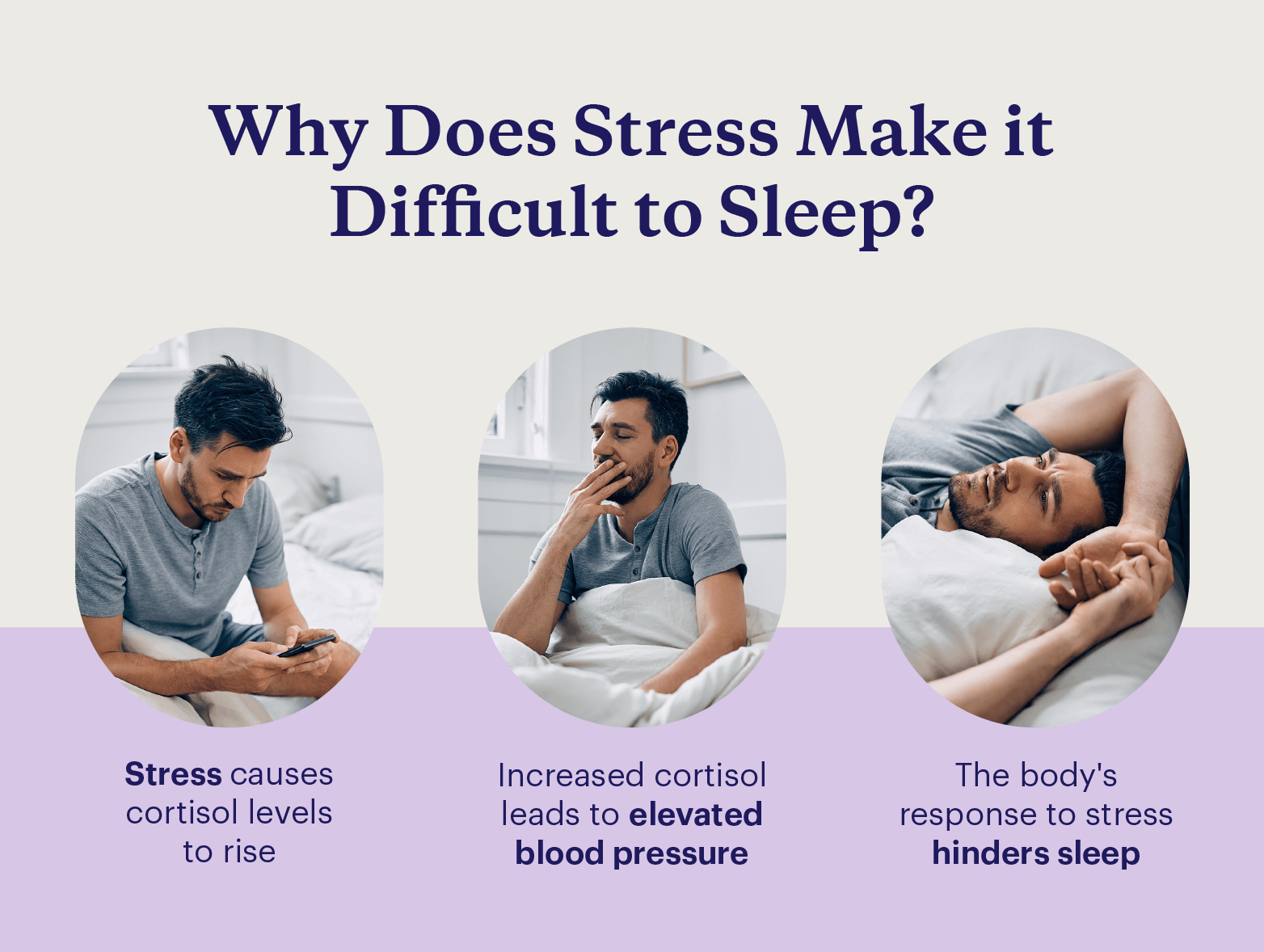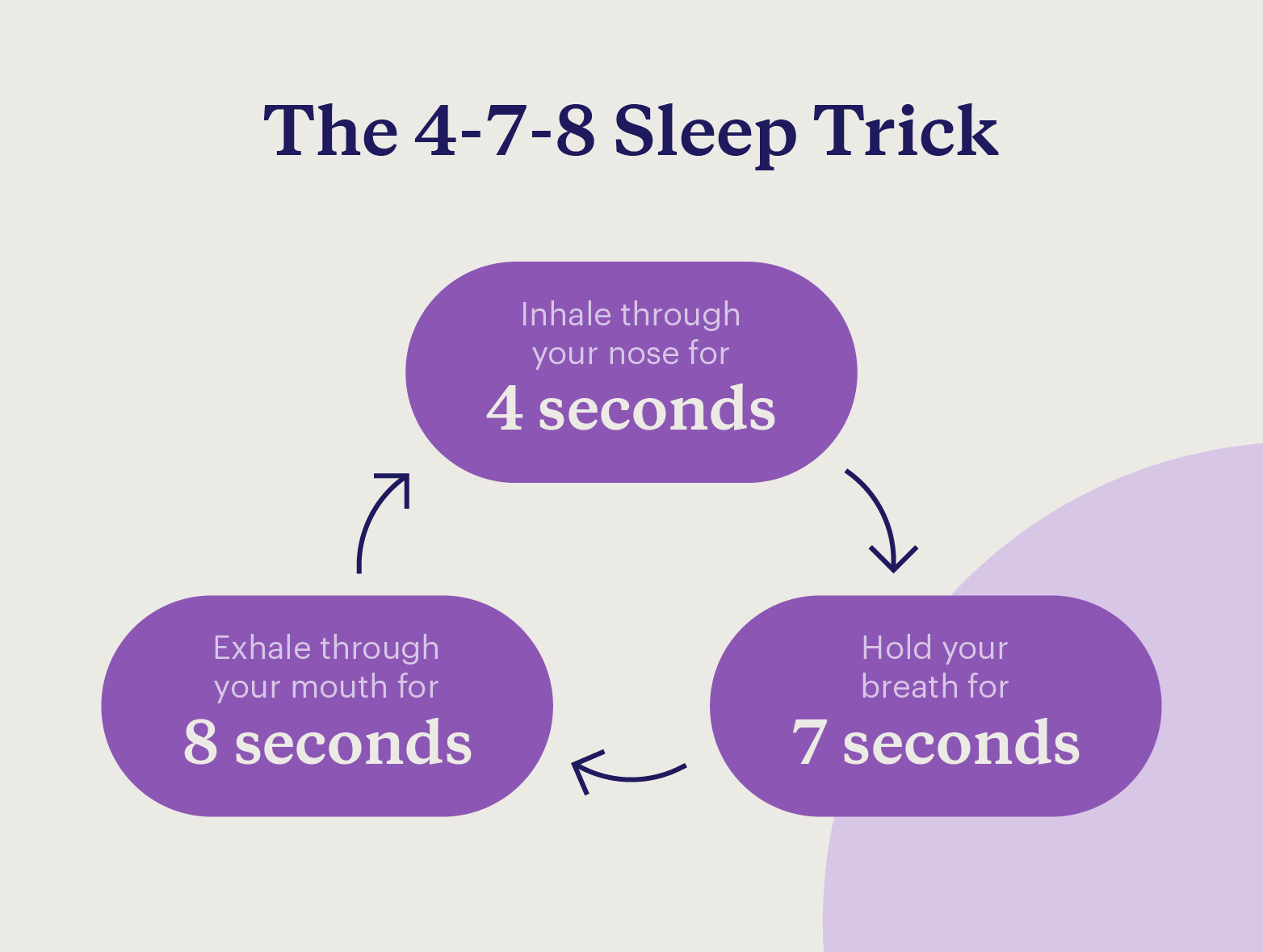
Too Stressed To Sleep? 11 Ways to Wind Down & Put Anxious Thoughts to Bed
If you feel like you’re too stressed to sleep, you’re not alone, but there are ways you can combat sleepless nights. Consider improving your sleep environment, exercising regularly, and keeping a regular schedule if you find stress keeps you up at night.
We’ve all been there. You shut off the lights, get in bed, prepare to fall asleep, and then your mind begins to race with stressful thoughts — sending you into an anxious state that can keep you awake for hours.
While you may just chalk this up to a couple of nights of poor sleep, keeping a healthy sleep schedule is imperative for being your best and most productive self — and poor sleep can have compounding consequences that can affect you in different ways.
Being too stressed to sleep can significantly impact mental wellness, and increased stress can make it harder to get the sleep we need. From dealing with the pressures of school or work to the stress of personal issues, an endless amount of triggers can cause us to lose sleep. However, humans need sleep to function, so if you’re experiencing strings of sleepless nights, getting on top of it is essential.
Fortunately, there are small changes you can make to your daily life that can help soothe nighttime anxiety and better prepare you for a good night of rest. Here are 11 easy ways you can destress your mind and sleep better.
1. Create a Sleep-Friendly Environment
Creating an environment conducive to sleep has proven effects on the quality of your sleep and your ability to fall asleep. According to the Centers for Disease Control and Prevention (CDC), you can create a sleep-friendly environment by taking the following steps:
- Make your room as dark as possible. You can use blackout curtains for this.
- Reduce noise as much as you can.
- Keep the room’s temperature cool.
- Don’t read, watch TV, or work in the room where you sleep.
Combining these elements to create a sleep-friendly environment should help you physically and mentally prepare for a good night of sleep.
2. Practice Stress Management Techniques
Stress management techniques can influence the physical symptoms of stress and anxiety, like increased heart rate and muscle tension. Techniques like breathing exercises and meditation can slow your heart rate and work to reset your nervous system when it enters fight or flight mode.
A few great stress management techniques to try before bed include:
- Mindfulness meditation
- Body scan meditation
- Deep breathing
- Yoga
3. Exercise Regularly
Regular exercise can benefit your mind and body, and thus your sleep habits as well. According to medical experts at John Hopkins Medicine, regular exercise can help relieve your mind of stressful thoughts and stabilize your body.
Researchers at John Hopkins Medicine also confirm that regular exercise helps people more easily reach the slow-wave stage of sleep, the deepest level of sleep. While in the slow wave stage of sleep, the body and mind can fully rejuvenate — allowing you to feel refreshed for the day ahead. Along with REM sleep, this stage is a part of core sleep, an essential element of rest.
4. Avoid Stimulating Substances
Stimulating substances can greatly affect sleep quality. These substances increase dopamine — which keeps you out of the slow wave stage of sleep and rapid eye movement (REM) stage of sleep.
According to researchers at the University of North Carolina, sleeping and waking up are controlled by several chemical changes in the brain, which are interrupted when you introduce stimulating substances. Substances to avoid before bedtime include:
- Coffee
- Soda
- Alcohol
- Chocolate
5. Keep a Regular Sleep Schedule
A routine is key if you’re looking to improve your sleep quality, especially if you often can't sleep at night. Going to sleep and waking up at the same time every day allows your body to form a biological clock that alerts you when it’s time to go to sleep and wake up.
A good way to put this into practice is by identifying when you’re most productive. If you hit your stride early in the morning, set an eight-hour sleep schedule from 10 p.m. to 6 a.m. If you’re a night owl, you can delay your bedtime, if your schedule allows, and set your biological clock from midnight to 8 a.m.
6. Limit Screen Time
It’s commonly known that the blue light that emits from smartphones and computers can negatively impact sleep, and while this is true, it’s not the only reason.
Your phone, notably social media, is an endless world of information that keeps your mind stimulated and engaged, which is the last thing you need as you’re winding down for bed. Looking at social media, email, or texts can inflame existing worries and enhance your stress levels right before you try to go to sleep.
7. Establish a Bedtime Routine
Like maintaining a regular sleep schedule, establishing a repeatable bedtime routine can also drastically improve your sleep quality.
Bedtime routines are good for alerting your body that it’s time for sleep and can include activities that naturally make you tired, so you’re prepared to doze off. Some good activities for a bedtime routine include:
- Taking a warm bath
- Doing breathing exercises
- Practicing meditation or yoga
- Reading
- Journaling
8. Journal Your Worries
Journaling is another effective technique for relieving stress. And when implemented into your bedtime routine, it can relax your mind so you naturally fall asleep at your desired time.
According to a 2013 study, people suffering from depression saw a decline in their symptoms after practicing expressive writing for a month. By directly reducing the physical symptoms of stress and anxiety, you’ll have an easier time falling — and staying — asleep.
9. Listen to Relaxing Music
Remember lullabies? Well, there’s a scientific reason parents sing to lull children to sleep.
Music and sleep sounds have also been an effective remedy for anxious nights. A 2011 study found that instrumental music directly lowered cortisol levels and helped pre-surgery patients reach a proper sedative level faster.
Introduce instrumental music or sleep sounds into your sleeping environment if you regularly struggle to fall asleep. If white or pink noise doesn’t lull you to sleep, try dozing off to some instrumental music.
10. Avoid Long Naps
We get it. Sometimes the events of the day wear you down, or bad sleep from the previous night makes it difficult to stay awake all day. However, taking long naps can damage your next night of sleep and throw off the sleep schedule you worked hard to perfect.
According to the CDC, the optimal length of a nap is 15 to 30 minutes. Naps at this length increase alertness, whereas longer naps put you into a deeper sleep and can make you groggy and less productive when you wake up.
11. Invest in a Comfortable Mattress
Don't ignore comfort if you’re repeatedly struggling to fall asleep — comfort starts with your mattress. Better mattresses lead to better sleep, which can lead to more happiness, healthiness, and productivity.
Purple’s GelFlex® Grid is an innovation in mattress technology designed to alleviate those nights of tossing and turning. Our mattresses instantly adapt to your body as you move around the bed — ensuring comfort at every toss and turn. If stress keeps you up at night, look for a mattress that fends against it.
How Stress Impacts Sleep
Trying to get good sleep while stressed out is like making a half-court shot while blindfolded. You can do it, but it’s tough to pull off.
There’s a biological reason for this.
When stressed, your body releases cortisol, the main stress hormone. This coincides with sugar, or glucose, entering the bloodstream, which elevates your blood pressure, resulting in your:
- Muscles tensing
- Heart pumping
- Mind racing
This reaction is best known as the fight or flight response, an innate survival mechanism our bodies activate when we’re in trouble. This, in turn, can make it difficult to get comfortable in bed.
When stress lingers for several weeks, it becomes chronic stress. High-pressure jobs, money worries, divorce, the death of a family member, or anxiety over current events can bring this on.
At that point, the body starts to get used to higher cortisol levels. This continues to get in the way of getting quality sleep and can lead to more serious health issues, including heart disease, hypertension, diabetes, and depression.
Frequently Asked Questions
The relationship between sleep and stress can be complicated, and sleeping better can often be more tricky than eating better or exercising a little more.
Here are some common questions and answers about how stress impacts sleep.
Does Poor Sleep Lead to More Stress?
Regarding the correlation between sleep and stress, it’s not a one-way street. Poor sleep can lead to increased stress and anxiety, making this a vicious cycle difficult to break out of.
Researchers from UC Berkeley found that a single sleepless night can lead to a 30% surge in emotional stress levels. Sleep plays a critical role in regulating our mood and helping us work effectively; when we don’t get enough of it, it’s harder for our bodies to properly manage stress.
Can Loneliness Make Stress Worse?
Researchers have found loneliness is a key source of acute and chronic stress. And as we just touched on, short-term and chronic stress are major hurdles in getting quality sleep.
The 2023 U.S. Surgeon General’s Report found that loneliness increases stress and the chances of cardiovascular diseases, diabetes, cognitive decline, and more. To safeguard against this — especially if you’re living alone — make sure you find time to talk to your friends and relatives. Phone calls are great, or you set up a Zoom or Skype call to catch up with people you haven’t seen in a while.
Whatever it is, just put in that extra effort to stay connected to those you care most about.
What Should You Do When You’re Too Stressed to Sleep?
Practicing mindfulness and exercising is a great place to start if your stress keeps you up at night. Taking time to meditate, doing breathing exercises, or simply going for a walk are easy ways to adjust your daily life so your body and mind are more prepared for sleep.
How Do You Force Yourself to Sleep When You Can’t?
It’s generally difficult to “force” yourself to fall asleep, but changes you can make in your life can have compounding effects that help you sleep.
When completed in tandem with each other, mindfulness, exercise, and routine should significantly help you get more tired and relaxed when it’s time to go to bed.
What is the 4-7-8 Sleep Trick?
The 4-7-8 technique is a breathing-focused relaxation exercise designed to help the body fall asleep.
The technique follows these steps:
- Inhale through your nose for 4 seconds.
- Hold your breath for 7 seconds.
- Exhale through your mouth for 8 seconds.
The idea behind the 4-7-8, and other exercises like it, is that you force the mind to focus on your breath instead of whatever other issues are on your mind. As a result, it should help reset your nervous system, relax your body, and help you fall asleep fast.
Why Can’t I Sleep When I’m Stressed?
You can’t sleep when you’re stressed because your body is experiencing fight or flight or the physical symptoms of stress. With your muscles tensing and your heart rate rising, falling asleep is virtually impossible.
Committing to routine, exercise, and mindfulness may not solve the issues that cause you stress, but they can help you get to a place where sleep is easier. And when paired with a comfortable mattress, you may find yourself sleeping easily each night and being happier and healthier because of it.
If you’re ready for the next step, explore Purple’s collection of mattresses and find the one that suits you best.



